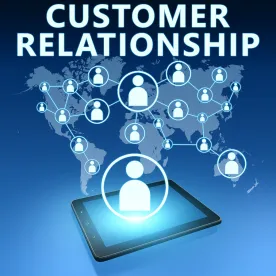Customer service skills for attorneys should always be a work in progress to improve the client experience. According to Lexis-Nexis’ Age of the Client, “eight out of ten lawyers believe they are delivering ‘Very well’ or ‘Quite well’ on all of the top client priorities.”
However, only 60 percent of clients believe the service they receive from their firm is above average. In my previous post, I shared the four keys of law firm customer service. These keys to customer service are incomplete due to attorney misperceptions surrounding indispensable customer service skills.
Why attorneys aren’t providing outstanding customer service
Most attorneys believe that their only job is to know the law and close this case for their client, but they should not overlook the power of customer service at each interaction with their clients. Attorneys and legal professionals have the misconception that good attorneys don’t have to focus their energies on anything but the case. As a result, clients do not receive the adequate care, guidance, and protection they need from their firm.
That’s your advantage. If you can overcome these stigmas, you’ll be able to achieve results other attorneys and firms can only dream off. Here are three customer service skills firms need.
#1: Selling to clients
Attorneys hate selling. At least, the vast majority of attorneys hate selling. Several pundits create strategies for attorneys who absolutely hate selling. Others, like James Bliwas, write provocative quotes stating that attorneys are incapable of selling.
“We have 231 lawyers and maybe 15 bring in nearly all of our new work. They’re good at it, but they’d be good selling widgets or mouse traps. Most of us don’t have the personality to ‘sell’ as you note in your essay. Expecting lawyers to sell is like trying to put a square peg in a round hole.”
Is this a case of can’t or don’t want to sell?
Gallup puts business executives and used car salespeople at the bottom of their honesty/ethics index. The perception here is that clients don’t like salespeople; salespeople don’t like selling. It can feel like they’re pushing services on clients they don’t need or want.
These behaviors create rejection. When most law firms attempt to “sell,” they make this mistake. They “pitch” unwanted products instead of identifying their client’s needs. It hurts to be on the receiving end of that rejection. That’s not selling. If that’s not selling, what exactly is it? Selling is matchmaking.
There’s a key distinction that needs to be made here.
-
Poor customer service: Salespeople try to push their products and services on to clients (regardless of need.)
-
Outstanding customer service: Professionals match solutions to their client’s problems.
The difference is the quality of service you provide your clients is taking in account what they need and where your services can help provide a solution that will benefit them. Selling them services they don’t need will feels like a sales conversation and may put them off because you’re not listening to their needs. Clients have problems, you have solutions. Most will need your help indefinitely, provided that you deliver superior value. Here’s an example of how you can effectively provide solutions to your clients needs that will also retain their business.
Problem: Your client needs to protect their business.
Solution: Help them incorporate their business.
Your client now needs:
-
All operating, partnership and employee agreements
-
Help and advice to protect their intellectual property
-
To negotiate your lease of office or retail space
-
Someone to draft software licensing agreements
-
A resident agent
Providing a solution for your clients in one area creates additional opportunities in many other areas.
# 2: Marketing and business development
The term “business development” is used synonymously with marketing. The trouble with that is the fact that they’re not the same thing. Here’s the difference:
-
Marketing is essentially everything you do to raise a decision maker’s awareness of the firm. It involves identifying your firm’s points of differentiation, developing a key message, and creating a strong positioning in your firm’s target markets. Traditional marketing tools and strategies for firms include advertising, sales collateral, website content, media relations, thought leadership materials, and other credentialing activities.
-
Business development is all about the individual lawyer creating, fostering, and leveraging partnerships and strategic relationships with existing clients and new prospects to generate business. At its core, business development is leveraging existing clients and referral sources as door-openers to prospective clients, as well as consistently creating new contacts and relationships. This is the attorney’s chance to sell themselves and their points of differentiation.
Business development is persuasion one-to-one, while marketing is teaching one-to-many. This isn’t an either-or proposition as attorneys and firms need both. As a lawyer, you’re a knowledge worker. This means giving your knowledge freely to your clients, prospects, and peers. If you’re a small business attorney, this could mean:
-
Writing articles for Entrepreneur.com, Fast Company, and Business Insider
-
Giving speeches at entrepreneur, startup and small business events
-
Hosting meetups or Q&As for business owners
-
Creating or appearing on radio shows and podcasts
Sharing your knowledge means you (a) identify your client’s problems (b) explain the consequences of ignoring the problem (c) provide solutions to their problems. All of which leads back to you.
#3: Providing realistic legal guidance to your clients
Having great customer skills as an attorney means having tough conversations with your clients. It’s important to provide realistic solutions and goals for your clients even if they might disagree. Presenting tough information to your client is all about the delivery. You want to come from a place of understanding, but also firm in your expertise and ensuring the client you’re keeping their best interest in mind.
In some firm cultures, it’s viewed as a serious breach of protocol to tell clients the truth. However, with good customer service training and learning to deliver difficult information with compassion and professionalism, your firm will build a reputation that clients will admire.
Sometimes customer service skills for attorneys require having difficult conversations with clients that will ultimately benefit them in the long run.
The takeaway on customer service skills for attorneys
Customer service skills for attorneys are vital to maintaining a healthy client-attorney relationship. From going above and beyond to wow your clients to having tough conversations, quality customer service comes goes a long way. Attorney’s should present themselves as understanding and compassionate to their clients, yet firm and confident in their legal guidance. With these 3 tips, you’ll build a loyal following of clients.



 />i
/>i

